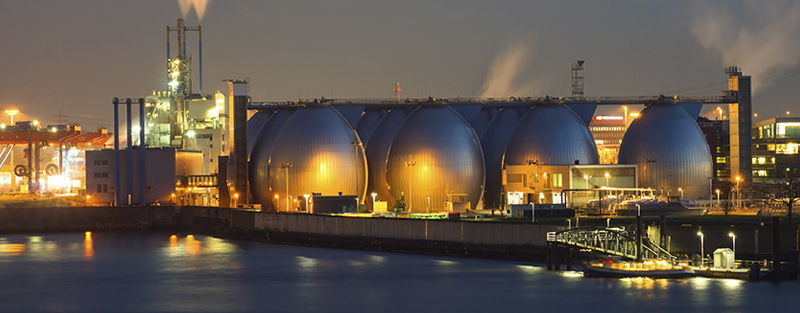Commentaires
Germany and gas shortage
14 juillet 2022

The Emergency Plan for Gas for the Federal Republic of Germany was published in September 2019. The third paragraph of the background section states “Germany’s natural gas supply is very secure and reliable”. It goes on to say, “a serious deterioration in supply cannot be ruled out completely… though the likelihood of such a severe crisis in supply actually occurring is very small.” On June 23, Germany announced they were moving to stage two of the three-stage national gas emergency plan due to reduced Russian gas supplies coming from the Nord Stream 1 pipeline. Currently at 58% gas storage levels, the German government is aiming to reach 90% by December.
Stage two does not involve gas rationing. The focus instead is on increased coordination with network providers and mechanisms such as an auction system to incentivize industrial users to slash consumption and sell back unused gas. These measures could come too late for some players as Uniper (UN01.GY) submitted a bailout application for government support due to financial distress (Uniper is not one of our holdings).
Stage two also allows the government to trigger an article of the new energy security law that would allow utility companies « in case of a substantial reduction in gas import volumes » to increase gas prices for companies and households to an « appropriate level » with a notice period of one week. An upward adjustment of retail gas prices could potentially have a double-digit percentage impact on inflation and negatively affect GDP growth due to weaker consumption. This would be an unacceptable situation for the German government. Should energy prices remain elevated, some kind of fiscal response would be needed, either to dampen the impact on retail gas prices or in the form of cut taxes.
By moving to stage two, the risk of advancing to the emergency level (stage three) is also clearly on the table. At stage three, gas rationing would be allowed for unprotected customers, including industrial users. Should gas supplies be interrupted, it is highly likely that Germany would fall into recession. This would be a huge blow to the manufacturing industry, which serves as the engine that drives the German economy. In June, the German Central Bank lowered its forecast for GDP growth in 2022 to 1.9% from 4.2%.
Natural gas provides about 25% of the energy needed for German industry, with over half of coming from Russian imports. Tough decisions would need to be made on which industries would be allocated gas supplies in order to keep producing, and which would be considered dispensable. For example, it would be impractical to turn off large gas-powered furnaces or smelters. Once they cool down, bringing them back up to the required operational temperature would consume even more energy. Switching to another source of power or relocating is also impossible, due to size as well as the environmental and economic cost. If the worst case scenario plays out and some industries do have to shut down in the winter, there would be significant job loss; one study estimates that Germany’s GDP could fall by 12.7%.
There are calls for home owners to have their gas boilers and radiators checked and adjusted to maximize their efficiency, and if possible, to save energy in order to reach the needed storage levels for winter. Vonovia (VNA.GY), one of Europe’s leading private residential housing providers with an estimated 1 million tenants in Germany, has instructed technicians to place a limit on its tenants’ overnight heating systems to 17° Celsius (63° Fahrenheit). (Note, Vonovia is not a Global Alpha holding.)
We will soon know how the gas supply situation will play out for the rest of the year. Regularly scheduled maintenance on the Nord Stream 1 pipeline that runs under the Baltic Sea from Russia to Germany started on July 11. In the past, the shutdown has lasted for approximately 10 days. If the gas flow from Russia does not start up when the maintenance is complete, the discussion around rations will ramp up and limits on hot water for private households should not be ruled out.
Aurubis (NDA.GY)
Our most exposed German holding to gas supply disruption is Aurubis. Aurubis is a leading global producer of non-ferrous metals and one of the largest copper recyclers worldwide. Annually, the company produces more than 1 million tons of copper cathodes as well as a number of other metals and additional products such as sulfuric acid. As an energy intensive business, increased energy prices have had an impact on costs, despite a large part of the company’s energy needs being hedged.
Aurubis can successfully pass on some of the higher energy costs to customers in the form of product surcharges. The biggest risk would be a lack of supply to two of its smelters that are reliant on Russian natural gas. Despite this, the share price weakness so far this year is more related to base metals and copper price in particular declining due to growing concerns over a global economic slowdown on the back of rapid interest rate hikes across the world. We continue to like Aurubis as a play on the secular recycling trend. The company has the multi-metal expertise and network to capitalize on the opportunity that is expected to present itself by way of a significant increase in the supply of complex recycling material.
Our other German holdings are less affected. Evotec (EVT.GY) is a biotech company that is a leading provider of outsourced services for early-phase drug research and development to the pharmaceutical industry. Patrizia (PAT.GY) is one of Europe’s largest real estate asset managers, with about €55billion of assets under management. Finally flatexDEGIRO (FTK.GY) is one of the leading and fastest growing online brokerage businesses in Europe.
While most of the focus has been on Germany, other European countries are affected deeply by the reduced gas supplies. The Global Alpha team is closely following the situation for any signs of escalation.





